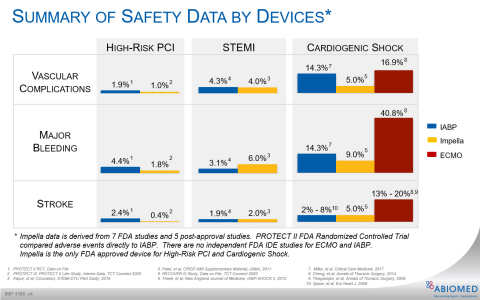
Figure 1: PROTECT III found, when compared to intra-aortic balloon pump (IABP), Impella use led to a 29% reduction in MACCE at 90 days.
November 12, 2020 — Abiomed recently announced new PROTECT III study data that demonstrates reduced rates of MACCE (composite of death, stroke, myocardial infarction and repeat procedures) when Impella is used to achieve a more complete revascularization in a single setting for high-risk percutaneous coronary intervention (PCI) patients.
PROTECT III is an ongoing, prospective, single-arm FDA post-approval study for the PMA approval of Impella 2.5 and Impella CP in high-risk PCI. The PROTECT III interim analysis findings were presented by William O’Neill, M.D., medical director of the Center for Structural Heart Disease at Henry Ford Hospital, at the 2020 TCT Connect meeting.
PROTECT III builds on the PROTECT II Randomized Controlled Trial (RCT) which found, when compared to intra-aortic balloon pump (IABP), Impella use led to a 29% reduction in MACCE at 90 days. The study authors analyzed patients in PROTECT III who would have qualified for PROTECT II, known as “PII-like” patients, and compared them to PROTECT II patients. PII-like patients in PROTECT III had improved 90-day MACCE rates, compared to PROTECT II patients (15% vs. 21.9%, p=0.035). (see figure 1)
The study also found PII-like patients in PROTECT III were older, sicker and more complex, with more comorbidities, more vessels treated and more rotational atherectomy, yet they had improved in-hospital safety with: • • Significantly fewer bleeding complications (1.8% vs. 12.5%, p<0.001)
• Similar low vascular complications (1.0% vs. 1.4%, p=0.659)
• Similar low instances of stroke (0.40% vs. 0.46%, p=0.913)
The PROTECT series of FDA clinical studies, which includes PROTECT I, the PROTECT II RCT and PROTECT III, is the largest-ever FDA study of hemodynamically supported high-risk PCI patients. This PROTECT III interim analysis included 1,143 patients undergoing elective non-emergent PCI with Impella at 45 sites between March 2017 and September 2019.
“This data is an important continuation of knowledge in high-risk PCI. Looking back at PROTECT II data, we understood the safety and efficacy of Impella,” said Jeffrey W. Moses, M.D., a PROTECT III lead investigator and director of interventional cardiovascular therapeutics and professor of medicine at Columbia University Medical Center. “But now, with PROTECT III showing fewer adverse events, we understand how to apply best practices and the result is better patient outcomes.”
“This novel, contemporary data from PROTECT III clearly demonstrates how the evolution and adoption of Impella best practices can lead to an improvement in safety and MACCE and it provides important information as we prepare for the upcoming PROTECT IV Randomized Controlled Trial of Impella in high-risk PCI,” O’Neill said.
PROTECT III is part of a growing body of evidence supporting the benefits of a more complete revascularization in high-risk PCI, which leads to better patient outcomes. The Restore EF study, presented at TCT Connect, demonstrates the use of contemporary best practices with Impella in high-risk PCI significantly improves left ventricular ejection fraction (LVEF), heart failure symptoms, and anginal symptoms at 90-day follow up in a wide variety of hospitals settings including rural, urban, community and academic centers. PROTECT III also strengthens the overall body of evidence about Impella safety, which is detailed in figure 2.

Figure 2.
The PROTECT III post-approval study will inform best practice protocols for the upcoming prospective, two-arm PROTECT IV RCT, which will leverage and validate key learnings from the cVAD Study, Impella Quality (IQ) Database and real-world data collected since the completion of the PROTECT II RCT. PROTECT IV will compare complete revascularization PCI with Impella to complete revascularization PCI without any planned hemodynamic support.
The PROTECT series of studies are sponsored by Abiomed as part of its commitment to improving clinical outcomes.
Related Impella Content:
VIDEO: Abiomed Highlights Trends and New Technology in Hemodynamic Support — Interview with Chuck Simonton, M.D.


 January 05, 2026
January 05, 2026 









